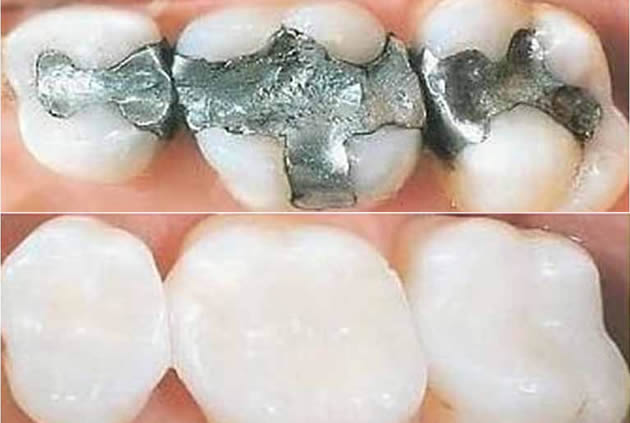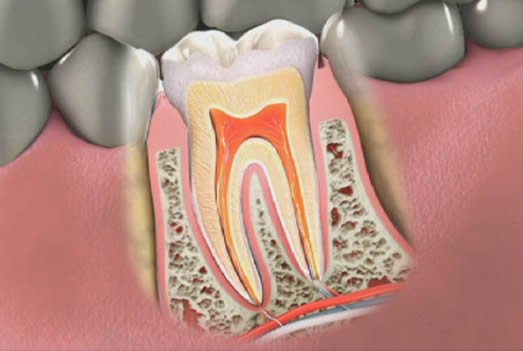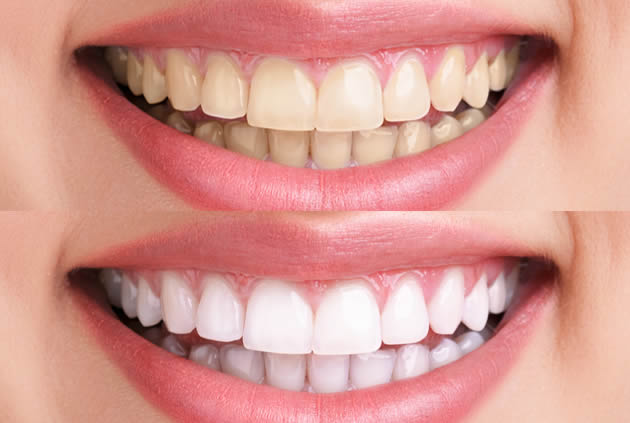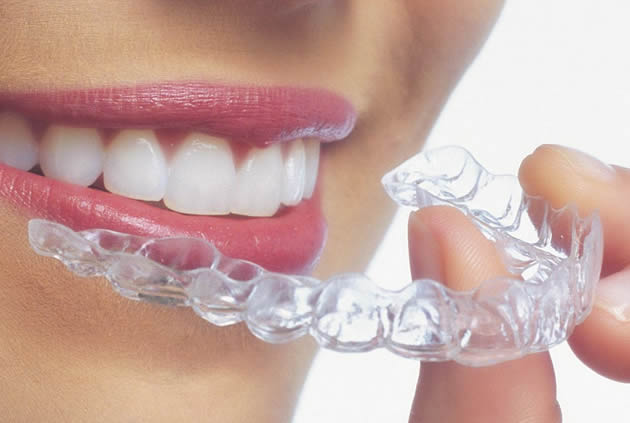
Many people think all that’s required to maintain good dental health is to floss and brush regularly. Unfortunately certain oral habits can negatively affect teeth, causing substantial damage. Trying to quit or at least curb these habits will help keep your teeth healthy and strong. Habits to avoid include:
Chewing Ice Cubes
Most of us have crunched on an ice cube on a hot summer’s day and thought nothing of it. Teeth are covered in a hard substance called enamel, but continually biting on items such as ice cubes or chewing on pencils and pens can eventually cause tiny fractures in teeth. Over time these fractures will become larger and you might require costly restorative work.
Nail Biting
Nail biting damages your nails and your teeth. You risk chipping or fracturing teeth, especially if they have been bonded or veneered. In addition, every time you put your fingers in your mouth you are transferring bacteria, increasing the risk of illness and infection.
Over Brushing Teeth
Some people think the harder they scrub their teeth the cleaner they will become. In fact you don’t need to brush your teeth particularly hard, and it’s best to choose a soft bristled toothbrush. Ask your family dentist in Baltimore if you’re not quite sure which brush is best.
Clenching and Grinding Teeth
Clenching and grinding is also known as bruxism and can cause teeth to become worn down, chipped and damaged, or may even lead to them becoming loose. The damage caused by bruxism can extend to your face, head and neck, and sufferers will often have headaches. Your general dentist in Baltimore can provide you with a custom-made night guard to prevent your teeth from biting together while you sleep.
Overusing Whitening Products
Most of us want to have a healthy white smile, and tooth whitening is one way to achieve this. Unfortunately some people take this too far and will overuse whitening products, causing tooth sensitivity and damaging tooth enamel. It’s best to book a professional tooth whitening treatment for the brightest and safest results.
If you live in the Baltimore area contact us today

Most people know that keeping your mouth clean is the best way to have an attractive and healthy smile. However not so many will be aware of the benefits to general health. Having healthy teeth and gums helps protect your overall health.
What Is Oral Health?
Oral health is concerned with the condition of any of the structures in your mouth, including your teeth, gums, tongue and all your oral tissues.
How Is Oral Health Related to Overall Health?
When your teeth and gums are healthy then it’s much easier to eat a varied and nutritionally sound diet. Choosing foods that are good for your teeth, for example those that are low in sugar, will also benefit your general health. Having a nice smile helps boost self-esteem, and good oral health decreases the risk of bad breath. It’s also much easier to speak clearly when you have all your teeth.
Which Oral and General Health Conditions Are Linked?
Oral health has been connected to a number of different general health issues. Clinical studies have found links between gum disease and diabetes. For example, uncontrolled diabetes can increase the amount of glucose in the saliva, increasing the risk of gum disease. Conversely gum disease causes bleeding gums that allow bacteria in the mouth to enter into the bloodstream where it’s thought they can create new sites of inflammation, making it more difficult to control blood sugar levels. In addition diabetics find it more difficult to heal. Gum disease has also been linked to heart disease, and people with unhealthy gums could be at increased risk of developing heart issues.
How Can I Achieve Good Oral Health?
It’s important to visit your family dentist in Baltimore as often as recommended. Book professional tooth cleanings at the same time as this will reduce bacteria in the mouth, helping to keep your gums healthy and strong. People with diabetes or other medical conditions that compromise their immune system may need to visit their Baltimore general dentist more frequently.

Restorative dentistry has made incredible advancements in the technology of restorative dental materials, and there are more options than ever today for your dental crown or dental bridge. Zirconium and porcelain have proven to provide lasting strength and durability, exhibiting the most natural cosmetic dental restorations available today. Each tooth in each mouth is different, however, and in some cases, resin composite or metal alloy might be the choice recommended for you.
Metals are a common choice for dental crowns and dental bridges. Gold or palladium alloys, as well as chromium or nickel (base-metal) alloys can be excellent choices. Metal alloy crowns show the least “wear down” over years of use. They almost never chip, break or wear down opposing teeth. The primary complaint about metal alloy materials is that their color is metallic and thereby unnatural. They will not blend with the surrounding teeth, and as such, they are chosen more for back molars where they won’t draw attention.
Dental composite/resin materials are a popular choice that can be made to blend with the surrounding teeth, but they’ve been shown to wear down over time and are more prone to fractures and breaking than other materials.
Porcelain can be fused to metal to form a natural-appearing crown or bridge, and because of their appearance, are a good choice for front or back teeth. Over time, however, discoloration can appear along the gum line as the porcelain wears away, leaving a dark, unsightly line. The porcelain can be fused to zirconium, however, which eliminates the dark line and is a good cosmetic choice for front teeth.
Crowns and bridges can also be made from all-porcelain or all-ceramic materials. These materials are the best choice for natural-looking teeth of the types of dental crown and dental bridge materials available in restorative dentistry today. Because they contain no metal, they are excellent choices for patients with metal allergies. They tend to be weaker and less durable than materials containing metals, however.
Talk to your cosmetic dentist today with any questions you have regarding what type of dental crown or bridge material is best for your smile needs.
We treat patients from Baltimore and the surrounding area
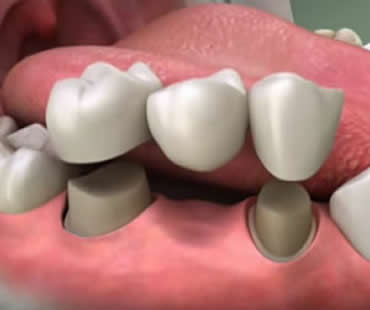
There are times when a tooth is so damaged from decay, trauma, or cracking that a filling isn’t the best choice. In these cases, a dental crown may be recommended for long-term tooth health. If a tooth is missing completely, your dentist may suggest a dental bridge to fill the gap between two bordering teeth.
Dental crowns, or “caps,” completely cover and protect your damaged tooth. It is bonded in place, giving you a stable, strong, and attractive alternative for your original tooth. Because it is customized for you using impressions your dentist makes of your teeth, it is a perfect match in size, shape, and position to your natural tooth.
Dental crowns can be the perfect solution to a severely damaged tooth. You won’t need to worry about pain, tooth stability, or your appearance when you choose a dental crown. Depending on what material is used, your crown can look as natural as your own tooth.
Dental bridges are designed to span a gap caused by a missing tooth. Having a gap in your smile can affect you in more ways than just cosmetics. Chewing and talking can become problematic as teeth adjacent to the gap begin to shift, leaving the potential for gum disease or jaw issues.
Dental bridges literally bridge the gap between two teeth. They are cemented onto the pair of teeth that border the empty space vacated by one or more missing teeth. The bordering teeth act as anchors for the bridge, and are trimmed down to hold a dental crown. Between the two crowns is a replacement tooth, customized for you by your dentist. Once the bridge is in place, you will regain the ability to smile freely while the bridge maintains the shape of your face and lips. You will speak more clearly and be able to eat a greater variety of foods. A dental crown also protects your healthy teeth from issues related to bite alignment.
Dental crowns and dental bridges are excellent choices for overall dental health, and can last a lifetime. To prevent damage to your dental work, avoid chewing things like ice or hard candy. It is also important to maintain regular dental checkups.
We offer dental crowns at our Baltimore dental office

If you have severely damaged, diseased or injured teeth, your dentist may recommend crown and bridge treatment. A crown is a dental restoration that fully covers a tooth and becomes the tooth’s new outer surface. A bridge is also a dental restoration that is anchored to natural teeth. However, a bridge replaces and fills the gap left by multiple missing teeth. Both crowns and bridges are made from a variety of materials and can be matched to the color of your natural teeth. Unlike removable dental devices like dentures, crowns and bridges are permanently affixed to existing teeth or implants allowing them to look and function similarly to natural teeth.
In addition to restored function and appearance, crowns and bridges offer a host of additional benefits including:
- Dental crowns protect and strengthen the natural tooth, helping you to avoid extraction.
- Crowns are the final step in root canal treatment, protecting the tooth from bacteria that could re-infect the treated tooth.
- Crowns and bridges restore missing teeth and support the remaining teeth.
- Your natural bite is restored and maintained with crown and bridge treatment.
- Placement of crowns and bridges improve your speech, smile and chewing function.
- Adjacent teeth are prevented from shifting and tilting with crown and bridge treatment.
- Crowns and bridges are long-lasting, predictable and durable.
- Placement of crowns and bridges is quick and can usually be completed in as little as two appointments.
- Alternatives to crown and bridgework, like dental implants, are usually more invasive requiring surgery and possibly bone grafting to place the implant.
Consult with your dentist to find out more about the advantages of crowns and bridges and how they can help to restore your healthy smile.
If you need a dentist in Baltimore contact us today

Whether you call it pop, soda, soft drink, or something else, these terms all refer to a sugary, carbonated drink popular all over the country. It is estimated that Americans consume over 13 billion gallons of soft drinks each year. These beverages can cause serious health problems, including negative effects on your oral health.
Soft drinks are one of the most significant reasons for tooth decay, and it impacts all age groups. From babies drinking it out of bottles to teenagers drinking it all day long to older adults sipping it in retirement homes, it is deteriorating tooth enamel and eroding gums of everyone who consumes it.
Why are soft drinks harmful?
The high sugar content in the drinks is the root cause of trouble, and the high acid content adds to the threat. The sugar combines with bacteria in your mouth to create an acid, which adds to the acid from the drink itself. Then this mixture attacks your teeth. Each time you take a drink of the carbonated beverage, an acid attack begins in your mouth. During this time, your tooth enamel is weakened and cavities are just waiting to form. You may think that the risk goes away by drinking sugar-free soft drinks. Although these are less harmful, they are still acidic and can lead to decay.
How can I avoid harming my teeth?
The ideal way to rule out risks from soft drinks is to cut them out of your diet completely. If you think you just can’t live without them, here are some suggestions:
- Drink more water.
- Set a good example. Drink alternatives yourself and encourage your kids to do the same.
- Sip with straws. This helps keep the sugar from direct contact with your teeth.
- Rinse with water. After drinking a soda, rinse your mouth with water to reduce the amount of sugar and acid hanging onto your teeth and gums.
- Use fluoride toothpaste and mouth rinse. Using fluoride in your daily dental routine helps to reduce decay and strengthen enamel. Also ask your dentist about the possible need for professional fluoride treatments.
General dentist in Baltimore – Schedule your appointment today.













